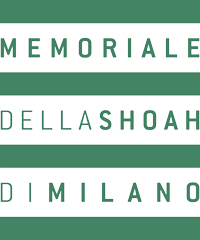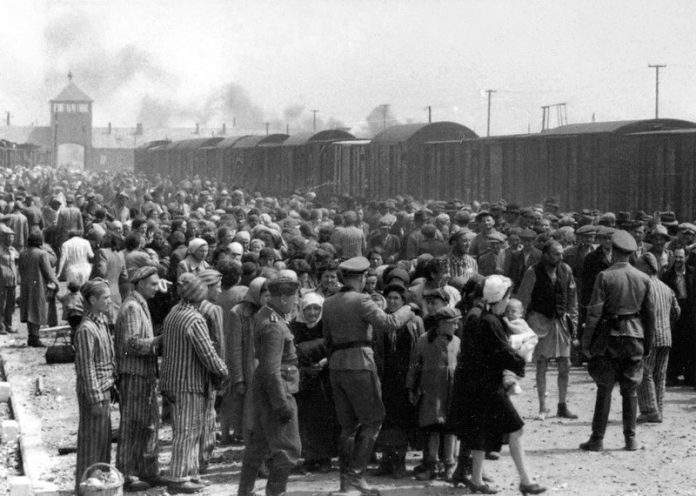In the last days of January the fifth ray of the San Vittore prison had filled up with Jews arriving from all over Italy; there were about seven hundred of us. […]
At one point, I think in the afternoon, a German came into the ray and read out the names of those who would leave the next day for unknown destination.
There were about six hundred names; it was never ending. […]
We all prepared to leave; we were given paper baskets with seven portions of galette, seven of bologna, seven of condensed milk. Why seven?
Why seven? How could I look at my Father, how could I ask him the reason for what was happening to us?
In those last hours in San Vittore I was silent; but every now and then I would turn away from Him, I would run like a madwoman up to the big common cells on the top floor to see all those unknown people preparing to leave, with equal gestures. It was the announced deportation, I was part of it too, my Father’s princess.
The next morning, January 30, 1944, a long silent and sorrowful line came out of the fifth ray to the prison yard. We passed through another ray of common inmates. They leaned out of the galleries and threw oranges, apples, cookies at us, but, most of all, they shouted words of encouragement, solidarity and blessing! They were extraordinary; they were men who, seeing other men go to slaughter just for the guilt of being born of one womb and not another, pitied them.
It was their last contact with human beings. Then violently loaded onto trucks, we traversed the deserted city and, at the intersection of Via Carducci, I saw my house in Corso Magenta 55 escape my sight from the corner of the tarp: never again. Never again.
When we arrived at the Central Station, the line of trucks threaded through the huge underground pass through the underpass of Via Ferrante Aporti; we were disembarked right in front of the shunting tracks that are still in the belly of the building.
The passage was very fast.
SS and republicans wasted no time: quickly, kicking, punching and clubbing, they loaded us onto cattle cars. As soon as a car was full, it was bolted and taken by elevator to the departure platform.
Until the cars were hooked up, none of us realized the reality. Everything had taken place in the darkness of the station basement, illuminated by powerful headlights at strategic points; amidst screams, barks, whistles and terrifying violence.
In the carriage it was dark, there was some straw on the floor and a bucket for our needs. The train moved and seemed to be heading south. It was going very slowly, stopping for hours.
From the grates we could see the Emilian countryside in the mists of winter and deserted stations with familiar names. The adults showed some relief since the train was not headed for the border; in the evening, however, there was a turnaround and no one slept that night. Everyone cried, no one resigned to the fact that we were going north to Austria; it was a chorus of sobs that covered the noise of the wheels.
From the plumbed cars rose a chorus of shouts, of calls, of pleas: no one listened. The train started up again. The carriage was fetid and cold, smelling of urine, gray faces, ankylosed legs; we had no room to move. The crying subsided into utter despair.
I was neither hungry nor thirsty. A kind of hallucinated starvation took hold of me, like when one has a high fever; when I could reflect, I thought that maybe, without me, Papa could have escaped from San Vittore, jumped that wall as another internee, Peppino Levi, had proposed, or maybe not. I clutched at Him, who was broken, pale, his eyes circled with the red of someone who has not slept for days. He urged me to eat something, he still had a chocolate chip for me; I put it in my mouth to please him, but I could not swallow anything.
In the center of the wagon, a prayer group formed: some pious men, among whom I remember Mr. Silvera, rocked for a long time reciting the Psalms; it seemed to me that they never ended: they were the lucky ones. The hours passed, so did the nights and days, in total abulia: it was difficult to calculate time. Very few still had a watch, and even those privileged few no longer looked at it. Every now and then I would see someone struggling to get up and try to figure out where we were, looking through the grates, screened with rags to shield that human cargo from the frost. A landscape bathed in snow could be seen, coquettish little houses, smoking chimneys, bell towers….
Before the Black Forest began, the train stopped and someone was able to get off among the SS men armed to the teeth, to get some water and empty the unclean bucket. My Father and I also got off and saw for the first time, written in chalk on the carriage, “Auschwitz bei Katowice.” We understood that that was our destination. The train left almost immediately and the news of our destination threw everyone into mute despair. It was silence in that carriage in those last days. No one cried or complained anymore. Everyone was silent with the dignity and awareness of the last moments. We were on the eve of death for most of us. There was nothing more to say. We clutched our loved ones and conveyed our love as a final farewell. It was the essential silence of the decisive moments in everyone’s life.
Then, on arrival was Auschwitz and the deafening, obscene noise of the murderers around us.



